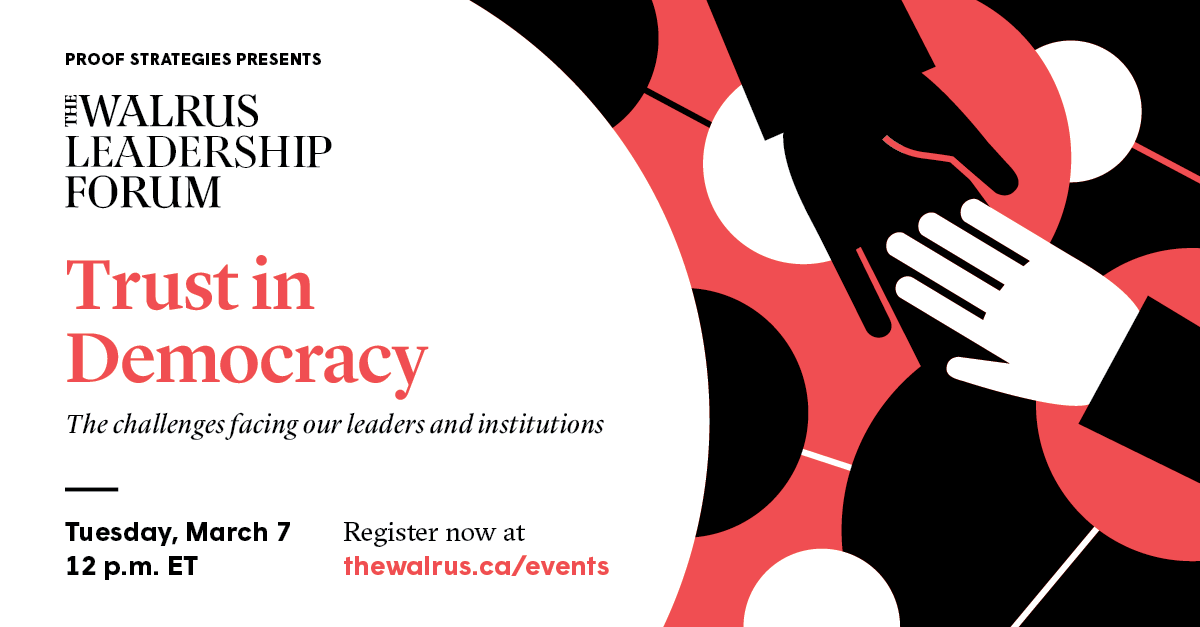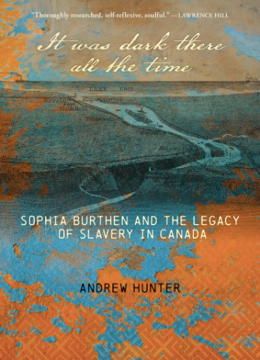
Hi, this is 2022 @TD_Canada Fellow Trisha Gregorio live tweeting @get_proof presents The Walrus Leadership Forum: Trust in Democracy! Join us to discuss who Canadians are putting their #trust in now with @BruceM1, @cathmckenna, @genevievetomney, @zainvelji @JamesMoore_org 

It has started! Watch live at: thewalrus.ca
We're kicking things off with a presentation on the key findings from the 2023 #CanTrustIndex report by @get_proof, which you can view here: getproof.com/trust/cantrust/
@get_proof "Trust is indispensable. It's like a lubricant that helps economies work faster and more efficiently and more productively. 64% of Canadians in our research agree that government has an important role. However, trust will come when governments can actually deliver." @BruceM1
"If you look over time in the 8 years we've been measuring, we're seeing an overall decline in trust. This year, you'll see a significant rebound, but still a relatively low number overall. But there's been a lot of effort put recently into rebuilding trust." @genevievetomney
"Governments, we know, have been under intense scrutiny during the pandemic. Canadians fundamentally don't believe that what is being promised is actually going to happen." @genevievetomney
The #CanTrustIndex also highlights political party affiliation as a dividing force, as well as a distinction between trust in government from millennial Canadians vs. boomer Canadians. But the values that stabilize trust in Canadian remain in place.
We are now welcoming our panelists @BruceM1, @cathmckenna, @zainvelji @JamesMoore_org with their opening thoughts and reflections on the challenges facing our leaders and institutions. #Trust #cdnpoli
"The truth is, politicians get to choose their voters. So the way in which politics can weaponize and divide is a much easier path to your next set of voters by energizing your base and doing so through aggressive tactics." @JamesMoore_org
"We don't rely on objective sources as much anymore. [Social media] creates an atmosphere where people are tuning out. Not only are people angry, it's also that people don't want to engage. But Canadians actually want to find solutions. They want to be positive." @cathmckenna
"The inflammatory algorithmic incentives of social media combined with erosion of trust—All of this leads to the perfect storm we find ourselves in. But I think defining us a polarized country is a huge mistake. Majority of us are in the middle, open to conversation." @zainvelji
"Diverse coalitions of young people come together to create solutions for an empathetic version of the future. I think that is the recipe to healing these divides and giving a voice to that 60% in the middle and not be defined by the corrosive nature of social media." @zainvelji
"Younger Canadians are bringing different values to the table. They're rightfully concerned about living costs, about the health of the planet, and they are looking for companies to take more leadership around these issues." @BruceM1
"Trust is the minimum. [Transparency] is what's missing. If you screw up, you admit it, then work harder to do better. We have to be more honest about what the challenge is. I think that's what Canadians want their governments to do. They want to see real progress." @cathmckenna
"If people aren't called out for excessive use of divisive rhetoric and tactics, the long-term stress is the public just walking away from politics and government." @JamesMoore_org
"For young people, the crisis is existential. It leads to them creating movements that are significantly more authentic. Young people don't have time for the purity test. Come as you are, we need you in the tent." @zainvelji
"The Western provinces are complicated. We are not the monolith you think we are. Some of that Western alienation drives mistrust, but you also have a growing, progressive class in our urban centres. There's a perfect squeeze happening right now." @zainvelji
The panelists discuss an audience question about how we can be confident that we live in a true democracy. @BruceM1, @JamesMoore_org and @cathmckenna explore the need for more politicians who know how to engage, incentivize, and be more ambitious with the problems they tackle.
"Majority of us have strong opinions loosely held—That's not a negative thing. We present strongly because we have to. That's the world. But our opinions might be malleable. We're open to changing our minds." @zainvelji
Panelists discuss the nature of party nominations, and what @cathmckenna and @zainvelji refer to as the club / in-group status that influences who gets to be politicians and policymakers across the country.
"How do we tackle big issues with real ideas and amibition? I think Canadians are aching for it, and are feeling a bit tired of all of it. There's an opportunity here for people to expect better from politicians, and for politicians to actually do hard things." @cathmckenna
Holding our governments and institutions to higher standards rather than giving in to the temptation of detaching is key to closing the conversation around #trust at The Walrus Leadership Forum: Trust in Democracy #cdnpoli
This has been The Walrus' 2022 @TD_Canada Fellow on Disability and Inclusion Trisha Gregorio, and thank you to for following along with our live tweeting of The Walrus Leadership Forum: Trust in Democracy!
Thank you to our partner @get_proof, to our panelists @BruceM1, @cathmckenna, @zainvelji @JamesMoore_org for the robust conversation, and to @genevievetomney for presenting key findings from the 2023 #CanTrustIndex.
You can view the results report from the 2023 #CanTrustIndex by @get_proof here: getproof.com/trust/cantrust/
And if you found today’s event engaging, please subscribe to the events newsletter from @thewalrus to stay up to date: thewalrus.activehosted.com/f/13
• • •
Missing some Tweet in this thread? You can try to
force a refresh









